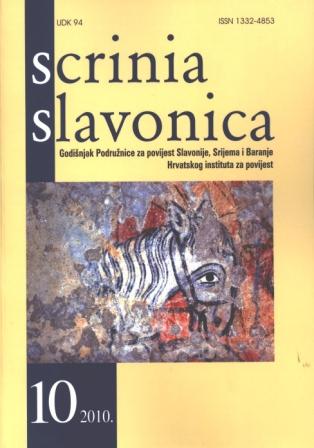Valpovačko vlastelinstvo i valpovačka mostarina 1731.-1737.
The Valpovo Manor and its bridge toll from 1731 to 1737
Author(s): Ljerka PerčiSubject(s): History
Published by: Hrvatski institut za povijest
Keywords: Valpovo; Valpovo manor; baron P. A. Hilleprand von Prandau; bridge toll; traffic; banditry
Summary/Abstract: Baron P. A. Hilleprand of Prandau, who was the owner of the Valpovo Manor since 1722, left us a wealth of valuable archive materials in form of letters he wrote to a number of persons and transcripts of letters he received from his supervisors of the Valpovo Manor, known as the Viennese Protocols. He also left manuscripts of annual supervisor reports, containing lists of all revenues and expenditures incurred in course of the business year, which started on May 1st and ended on April 30th next year. The manuscript books, consisting of thread-bound folio-format papers with covers, are supplemented by the Reference Book 2 from January 1st, 1731 to August 31st, 1737. The first page of the manuscript book, in addition to the title, contains four straps covered in seal wax and imprinted with the official seal of the Valpovo Manor. Each page contains entries about bridge toll collected in course of a month, divided by days. The accuracy of the sum at the end of the page is confirmed by the signature of the supervisor of Valpovo. The Viennese Protocols contain a transcript of the regulations on the duties of the official collecting the toll. There is a description, a valid price list, and a price list for the use of the ferry near Miholjac. The transcripts provide all kinds of information about the passage of goods and persons. Brief records of events described by passengers, for instance, records of troubles, such as thefts and robberies that occurred on the roads or in the villages, have been recognized as extraordinary historical sources. It is also interesting to read how some people caused trouble on the bridge or tried to get away without paying the toll. Supervisors’ records about the special costs of restoring safety to the Manor’s roads and villages in this period are extraordinary testimonies to the cruelty of the outlaws, rebels, and bandits. The Manor’s efforts to catch the transgressors by organizing a militia, offering rewards to informants, and putting prices on the bandits’ heads give us an even better idea of the troubles they faced in their everyday life. The records about numerous costs of special military interventions, pursuits, executions, and treatment of the wounded add to our knowledge of how difficult and insecure life had been back then.
Journal: Scrinia Slavonica
- Issue Year: 2010
- Issue No: 10
- Page Range: 168-196
- Page Count: 29
- Language: Croatian

